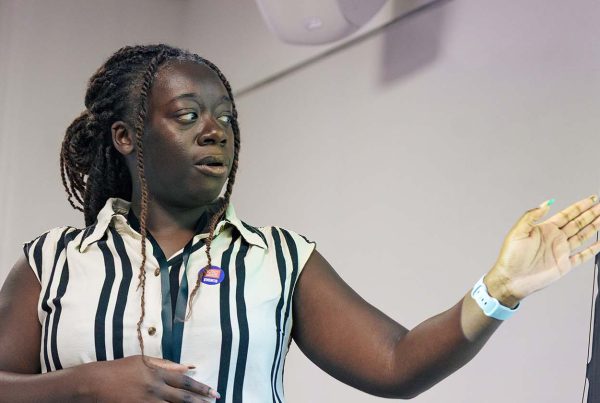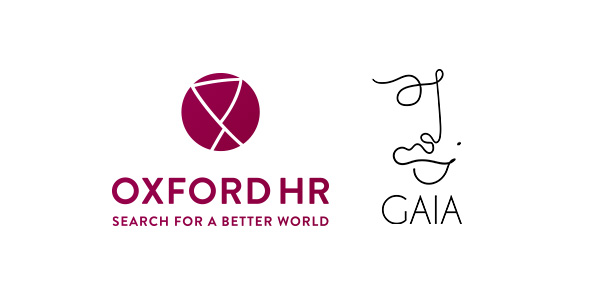- Over 900 Participants from over 250 Organizations
- Participants from 120 Countries
- 100 Speakers from 16 Countries
- 84 Sessions offered to participants
- 2,800 Cumulative Hours of Programming Consumed
- 11,664 Cumulative Sessions Viewed
- 750 Networking Sessions Cumulatively Attended
Emotional Intelligence and Women’s Leadership in Times of Crisis
This was the first workshop OXHR attended at the 2021 WILD Forum and the first thing that struck me, was the honesty and transparency with which these panelists spoke. Maybe not entirely surprising given the subject matter, but there was a real sense of togetherness and support within this group. The aim of the discussion was to examine what being an empathetic leader means, how you can develop this skill and what organisations can do to support a culture of understanding.
Starting with Ellen Yount, Vice President at MSI, a Tetra Tech company, she voiced her understanding of empathy to be “listening – really listening; being authentic, being quiet and leaning in”. It’s a two-way communication and it’s ok not to be ok – especially given the current global circumstances, there has to be a focus on mental health. Her advice was to ‘bring your whole self to work’ – as someone looking to advance their career, as a mum/wife etc. This point is as much valid for those within your team, as it is for you as an empathetic leader to lead by example and show a more human side.
Following on from this point of modelling through behaviour, Adrienne Raphael, Chief of Party also for Tetra Tech, makes the point too about work / life balance and prioritising your personal life in order to be successful in your work life. A simple rule was the example of if you are on vacation, be on vacation and don’t check emails etc and don’t expect others to either.
There was a point made in the opening plenary of the WILD forum about looking for opportunities within your team or organisation, no matter how small, to foster leadership and show your humanity, “I see you and I value you”. This sentiment was very much agreed with by Jeanelle Blancgard of Tetra Tech, who states it is key to “treat people like people and to understand their motivation in the workplace and personal life priorities – people are so much more than the face they bring to work”.
Another interesting element to the discussion was around what you can do to build a positive work environment? Ranelle Sykes, Chief of Party at MSI advises to control the elements you can control, for example how you talk to people, making people feel safe and valued and allowing one to one development time with your team members to ensure they feel this support.
This human touch has been made infinitely harder during the COVID crisis, but nonetheless we can still take measures to approach these things virtually by reaching out to our colleagues and team and keep the conversations going. Empathetic leadership isn’t a choice, it’s essential.
WILD Forum: Failfest
Embarrassment, frustration, panic, anxiety, fear and sadness are all words that popped up in the WILD Forum chat box when our moderator asked what comes to mind when thinking of the word ‘failure.’ Of course, we’ve all heard the anecdotes; ‘failure is the best teacher’, ‘you’ve got to fail before you succeed’, ‘failure is a great opportunity’, and so on and so on. So why is it that the first words that spring to mind are overwhelmingly negative? This panel explored three women’s very different experiences with failure.
Our first speaker, Carla Chamoun (Director of Credit and Operations, Vitas), spoke on the Rise and Fall of a Working Mum, and how she often felt she was failing at both the roles of a mother and a senior leader for a long time. Conversations with family members and friends led to feelings of guilt – ‘why don’t you quit your job? You should spend more time with your children’, which ultimately culminated in Carla resigning from her job. Her boss was less than supportive which led to even more feelings of guilt and frustration. What really helped changed Carla’s outlook, she describes, was life coaching. Carla cannot stress the importance of gaining outside perspective; this really helped her to understand that she didn’t need to be THE best to succeed, she just needed to do HER best. It also highlighted the need for her to take time each week for herself, and that asking for help is never a sign of weakness.
‘I love my job, but that doesn’t mean I don’t love and miss my children.’
Tine Knott (Senior Vice-President, DAI), spoke on her failure of exercising humility in her professional life. Her emphasis was placed on her generation; growing up in the late 80s and 90s means that statistically these women are now at the apex of their careers. As a girl, she often observed gendered differences between how men and women were treated, and how she needed to work like a man to achieve success in her career. This fear of failure, and the focus on success, often meant that humility was left behind. As she grew older, Tine began to see that humility is the hardest quality to incorporate into leadership, mainly because it is seemingly in conflict with the ‘more traditional’ elements of strong leadership, which were often in line with gender expectations. She also mentioned that Imposter Syndrome added a further barrier; trying to walk the line between confidence and humility, with Imposter Syndrome blocking the way, was an almost impossible task. Tine ended her talk by noting that older women need to act with grace around younger women professionals. Just because their generation faced difficulties, it doesn’t mean everyone else should. She also asked empathy from younger women, as the career ladder was harder to climb for older women, and there was less space for humility.
‘Humility is so darn difficult for women of a certain age.’
Saraounia Mboka-Boyer (Systems and Institutional Governance Technical Advisor, IRC) talked about where we are failing with regards to Diversity in International Development. In particular, Saraounia emphasised the multifaceted nature of diversity, and that tokenism and tick box exercises are not enough. Diversity is not a formula and often individuals are not considered a holisitc person but reduced to traits such as skin colour and sexuality. What about class diversity, diversity of experience and thought, and the intersection between them all? The conversation moved to how, as a sector, we need representative diversity which identifies these intersectional experiences to move to the next phase of inclusion. One of the ways to achieve this, she notes, is to just ask people what they think and what they want. We should ask communities why their girls are not in school, why they have violence in certain areas, why will our work affect their life and how can we support them? There is knowledge in these groups, and we need to be representative of the kind of diversity we promote. Diversity is not enough, we need to share our cookbooks and allow others into the kitchen, and not just let them sit at the table.
‘In 2021, diversity is not the silver bullet that will end inequality, diversity is the minimum.’
The three biggest takeaways? Don’t be afraid to be vulnerable and ask for help; don’t underestimate the power of humility; and be open.



